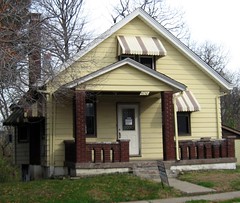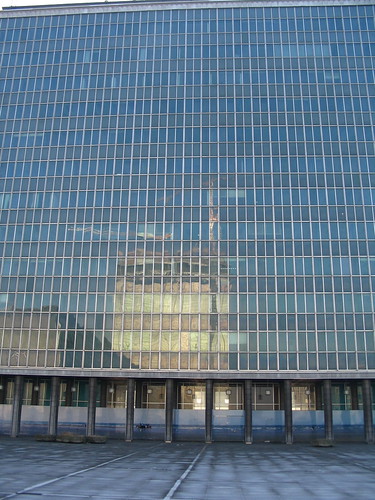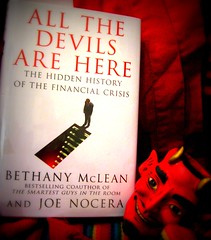Question by america first: Who really caused the sub-prime crises Democrats?
The Subprime Debacle
by Dr. Kuni Michael Beasley
30 Years in Gestation
The Democrats are doing a lot to try to pin the subprime debacle on the Republicans and the Bush administration. However, there is a long tail to this problem that just happened to pop at this time.
Now, for the rest of the story. Definitions first.
Fannie Mae is the Federal National Mortgage Association (FNMA), founded in 1938 as a publically traded government sponsored enterprise (GSE) that is stockholder owned that makes loans and issue loan guarantees.
Its cousin is Freddie Mac, the Federal Home Loan Mortgage Corporation (FHLMC), founded in 1970 as another GSE created to expand the secondary market for mortgages. Freddie Mac buys individual mortgages on the secondary market, pooled them into packages, and sold them to investors on the open market.
The secondary market packaged mortgages as collateral and issues securities called collateralized mortgage obligations (CMO) and collateralized debt obligations (CDO), to reduce the risk of individual loans. CMOs are a separate entity that is the actual legal owner of the mortgages it has in a “pool.” CMOs sell bonds to investors based on the value of the mortgages. Investors receive payments based on the increased value of the loans in the pool. The collateral for the bonds are the actual mortgages.
CDOs are a separate entity like CMOs, but are more focused on fixed income assets such as, but not limited to mortgages (and can include commercial mortgages and corporate loans). The focus is cash flow and slices (tranches) of these cash flows are sold to investors.
The subprime mortgage crisis surfaced first in 2007, but it had been incubating for years, indeed, decades. Though roots can be traced back to the New Deal legislation in the 1930’s, the current crisis actually draws its source from the Community Reinvestment Act (CRA) [1977] during the Carter administration that forced banks to lend money to less credit worthy clients. Lending institutions were evaluated to determine if it met the “credit needs of the community” and this was factored into regulatory decisions of the federal government such as applications for facilities, mergers, and acquisitions.
Interest in the CRA resurfaced in the Clinton administration when regulations in the CRA (which could be manipulated without any participation of congress) essentially forced institutions to offer loans to higher risk individuals and businesses. The term “Ninja” loans emerged describing high risk loans made to people with No Income, No Job, and no Assets, but completed a particular bank’s portfolio sufficient to keep federal regulators off their backs.
As access to easy money for high risk borrowers increased, certain institutions began to take advantage of these new opportunities to score fed points and make easy money. Name dropping here: Countrywide began to process, package, and offer investment instruments (CMOs) based on these loans. Revisions to the CRA by the Clinton administration allowed mortgage companies to offer loans without the relative reserve of deposits normally required of banks and other financial institutions.
In addition, this allowed for securitization of sub prime mortgages based on the pooling and packaging of cash-flow producing assets into securities that could be sold to investors – with the asset value not tagged to actual value of the property, but to the value of the cash flow produced by the asset held (sounds weird). The first public securitization of CRA loans was started in 1997 by (familiar name) Bear Stearns!
Now, let’s understand sub-prime loans for a moment. A sub-prime loan is a mortgage offered at a deep discount on interest the first year or two so the borrower could qualify for a larger loan and more expensive house, betting that their economic profile would get better and they could afford large payments later. Adjustable Rate Mortgages (ARMs) are a form of this where the entry rate is low and rises based on certain criteria such as the rates for government securities.
Simply put, lenders (not necessarily banks, but more often mortgage
companies) offered low cost, low entry rate mortgages to people who would not normally qualify for that amount of debt.
These loans were “warehoused” by financial institutions, where a financial institution like Merrill Lynch would set up a separate, but wholly owned mortgage company (First Franklin) to attract loans.
Merrill Lynch would retain control of the loans as a “trustee” or “servicer,” and derive benefits from fees for “managing” the loans and increase assets by keeping escrow deposits. In turn, these loans would be sold to Fannie Mae or Freddie Mac (who were assumed to guarantee the loans), who, in turn, repackaged them for the secondary market.
In 2003 the Bush administration tried to head-off what they saw as a potential crisis by moving the supervision of Fannie Mae and Freddie Mac under a new agency
Best answer:
Answer by Hater Police
Both parties are to blame AND financial companies AND consumers.
Add your own answer in the comments!



















